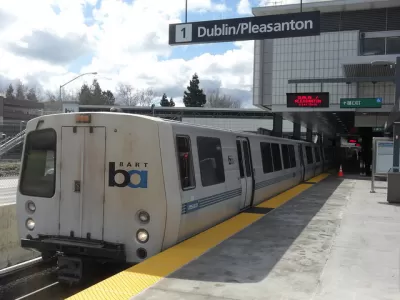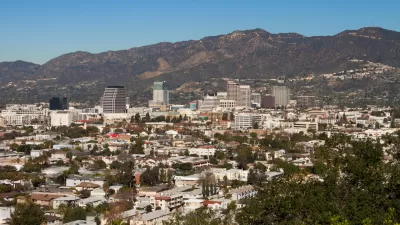Another bill under consideration by the California State Legislature would take land use control away from local agencies near transit stations. In this case, the new authority would be regional.

"Cities reluctant to OK housing on BART’s expansive parking lots and other land owned by the rail system would be forced to allow it under a new bill unveiled this week," reports Katy Murphy.
On Monday, Assemblyman David Chiu, D-San Francisco, introduced Assembly Bill 2923, along with Assemblyman Tim Grayson, D-Concord. The bill would "require BART to approve new standards for housing development that reflect the ambitious goals the system recently set. Local governments would have two years to update their zoning restrictions accordingly."
As for the goals set by BART, in 2016 the regional commuter rail system's Board of Directors set a target for 20,000 residential units to be built on BART property by 2040 [pdf]. That total is expected to contribute 12 percent of the transit oriented development goals established by Plan Bay Area.
While the bill would allow BART more control over development on BART property, allowing the priorities of the regional agency to override local obstruction of development at transit stations, the bill would have far less impact than SB 827, proposed by state senators Scott Wiener and Nancy Skinner. That bill would mandate new zoning rules (in effect: an upzoning) around transit stations regardless of property ownership and on every variety of transit line in the region.
The Non-Profit Housing Association of Northern California and the State Building & Construction Trades Council of California sponsor the bill.
FULL STORY: 20,000 new homes by BART stations? A new California zoning bill aims to speed building

Study: Maui’s Plan to Convert Vacation Rentals to Long-Term Housing Could Cause Nearly $1 Billion Economic Loss
The plan would reduce visitor accommodation by 25,% resulting in 1,900 jobs lost.

Alabama: Trump Terminates Settlements for Black Communities Harmed By Raw Sewage
Trump deemed the landmark civil rights agreement “illegal DEI and environmental justice policy.”

Why Should We Subsidize Public Transportation?
Many public transit agencies face financial stress due to rising costs, declining fare revenue, and declining subsidies. Transit advocates must provide a strong business case for increasing public transit funding.

Paris Bike Boom Leads to Steep Drop in Air Pollution
The French city’s air quality has improved dramatically in the past 20 years, coinciding with a growth in cycling.

Why Housing Costs More to Build in California Than in Texas
Hard costs like labor and materials combined with ‘soft’ costs such as permitting make building in the San Francisco Bay Area almost three times as costly as in Texas cities.

San Diego County Sees a Rise in Urban Coyotes
San Diego County experiences a rise in urban coyotes, as sightings become prevalent throughout its urban neighbourhoods and surrounding areas.
Urban Design for Planners 1: Software Tools
This six-course series explores essential urban design concepts using open source software and equips planners with the tools they need to participate fully in the urban design process.
Planning for Universal Design
Learn the tools for implementing Universal Design in planning regulations.
Smith Gee Studio
Alamo Area Metropolitan Planning Organization
City of Santa Clarita
Institute for Housing and Urban Development Studies (IHS)
City of Grandview
Harvard GSD Executive Education
Toledo-Lucas County Plan Commissions
Salt Lake City
NYU Wagner Graduate School of Public Service





























